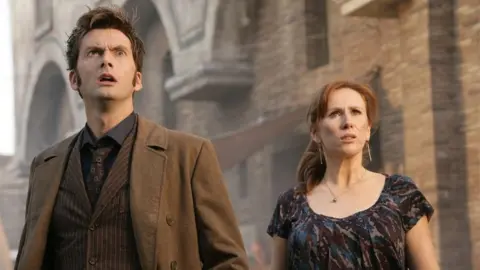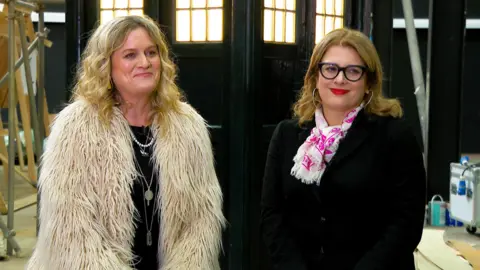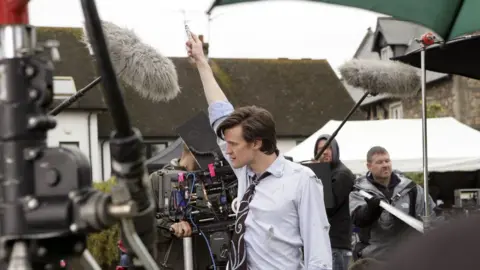Doctor Who: How the sci-fi show made millions for Wales
 BBC
BBCBringing Doctor Who to Wales was a "leap of faith", according to the team that brought it to Cardiff.
Since 2005 the hit sci-fi series has been made in Wales, first by BBC Wales and now by Cardiff production company Bad Wolf.
The show is celebrating its 60th anniversary with events in the capital and an upcoming trio of new episodes starring David Tennant.
Ncuti Gatwa is set to replace him as the next Time Lord on Christmas Day.
The show's production has also created "thousands of jobs", birthing a wider TV drama industry around it, and contributed more than £134m to the Welsh economy.
Cardiff was chosen as the home for Doctor Who by the BBC in 2004 and it began filming the following year.
It was the corporation's then drama commissioner Jane Tranter who persuaded BBC Wales head of drama Julie Gardner to work with writer Russell T Davies to create the new series in the city.
All three are now reunited as Tranter and Gardner's production company Bad Wolf is making Doctor Who for the BBC at its Wolf Studios in Splott, with Davies again penning the scripts.
Asked about the original risk they took relaunching it and basing its production in Wales, Jane Tranter said: "You call it a risk, I call it a leap of faith - or bloody-minded determination that this is what we are going to do.
"I never felt it was a risk to bring back Doctor Who, and as soon as Julie and Russell were involved I didn't think it was going to be a risk at all."
Cardiff quickly became a backdrop for a succession of new Doctors, beginning with the 2005 revival starring Christopher Eccleston.
He was followed by David Tennant, Matt Smith, Peter Capaldi and Jodie Whittaker.

Now Tennant is set to make an imminent return to mark the show's landmark birthday, before Gatwa becomes the 15th Doctor on 25 December.
The success of Doctor Who has coincided with increased demand for high-end TV dramas, and a sprawling Welsh production base has emerged.
"We have always believed the crews and the locations are here, it's a place of endless possibility," said Ms Gardner.
"That said, Cardiff and Wales in 2023 is very different in spirit to where it was in 2004.
"Back then there was a lot of suspicion about Doctor Who coming 'down the motorway from London'.
"It's like it wasn't quite real, or wouldn't be Welsh enough, wouldn't do enough or be taken away."
A BBC report into the economic impact of Doctor Who found more than £134m in gross value added (GVA) in Wales, and a total UK contribution to the economy of £256m.

But it also triggered a far greater investment by other production companies who were persuaded to film in Wales after witnessing its success.
"I had no idea it was going to be as popular as it is now," said Danny Hargreaves, who provided special effects for the first series of Doctor Who before opening Real SFX in 2008.
He still makes explosions and blizzards for the series, with a workshop in Cardiff that houses cutting-edge equipment.
"We get to build some really cool stuff and the show gives me a licence to blow up stuff," he added.
Danny has witnessed the broader impact of the iconic TV series on Wales's production sector.
"What people don't realise is how much of an impact Doctor Who created here in Wales," he said.
"It was really the catalyst for what is an exceptional industry in Wales, and many different productions from all over the world have filmed here since."
 BBC/Bad Wolf/Disney
BBC/Bad Wolf/Disney Meanwhile, returning showrunner Davies is as great an advocate for Wales in 2023 as he was in 2005.
He said he would have rejected the option to make the show in London.
"I've lived in Manchester for many years, made Queer as Folk there and done tonnes of dramas there with a local flavour," he said.
"But I'm fundamentally Welsh, so to bring Who here was a great opportunity.
"I think if they'd asked me to make Doctor Who in London, I would have refused," he added.

- BLACK MUSIC WALES: The artists who pioneered black music in Wales
- BAFTA CYMRU WINNERS: Check out these award winning shows

